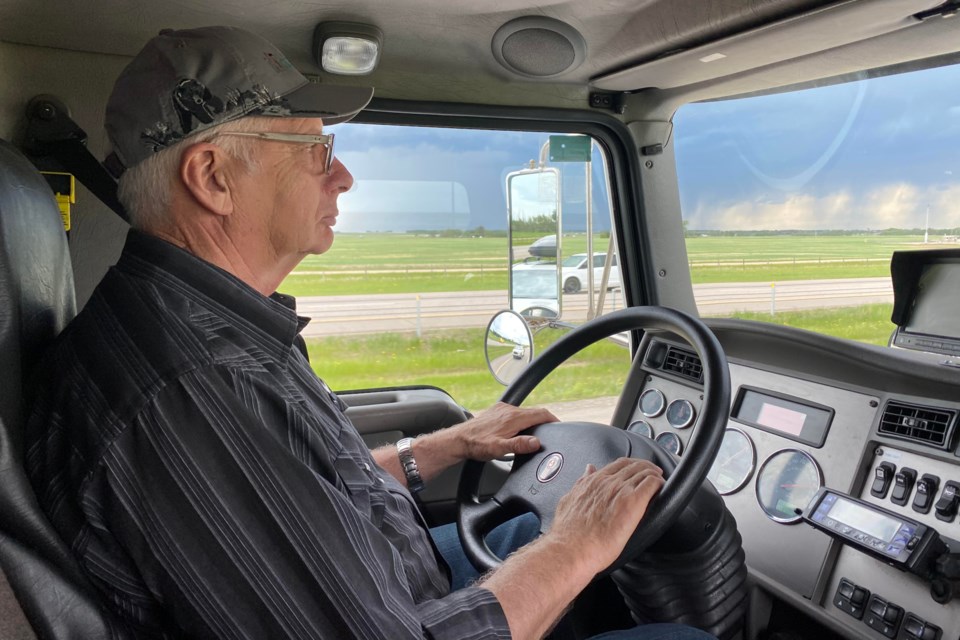A clear radio signal for a country station is sweet music to the ears of semi truck driver Bob Scriba.
"I prefer country. I like the old stuff," said the veteran operator, who says the road has become his refuge more than ever in 2020.
He added, "I’m happy once I get in my truck and on the road."
But away from the open highway, Scriba has hit a few roadblocks this year.
Masks, barricades and other COVID-19 safety protocols have created new challenges for the 68-year-old Sherwood Park man.
"Many people are behind Plexiglas shields and mumble so those of us who are a bit hard of hearing struggle," said Scriba, adding it has been an issue from truck stops to warehouses.
He finds it difficult to understand staff "talking through their mask behind a shield. (It is) frustrating for all of us who need several repetitions to get our points across."
Scriba said warehouse stops to pick up loads are often more time-consuming due to COVID-19 – doors are locked in order to limit access, and drivers sometimes have to wait for a while for someone to show up and help them out.
"This year has been busy and challenging for sure, due to additional safety and security measures. Masks are mandatory in many places where we load or unload," said Scriba, whose work this year has so far taken him from Alaska to Edmonton, east to Montreal and several points in between.
Purchasing food has required more creativity when truck stop restaurants are closed.
During the early months of the pandemic, Scriba said he did try walking through drive-thru fast food eateries "with little success,but some workers did take pity on me and accepted my money."
He said truck stops have tried to be accommodating and have sandwiches, coffee and snacks available when sit-down service is not available. He likes to buy food at a grocery store and use “a plug-in cooler to pack healthy choices,” adding, “This is not always workable as I often change trucks or fly to destinations to pick a truck up."
A part-time driver who has been operating semis without sleeper berths, Scriba stays in hotel rooms on longer trips.
"This is very nice luxury for me. I do think about hotel cleanliness, but so far I’ve had nice hotels and they are doing a great job of cleaning," he said, adding many drivers with sleeper berth are required to purchase a shower room because "many truck stops don't want you washing your face or brushing (your teeth) in the main washroom."
While he averages 800 to 1,100 km per day, Scriba has noticed less traffic on the road in 2020.
"There is very little oilfield equipment moving around and I noticed a big drop in tourist travel trailers on the road," he said.
"It makes driving a bit more relaxing once on the highway."
Scriba said the company he works for is having a hard time getting qualified drivers.
"There are too many of us baby boomers thinking of retirement or wanting to slow down. More and more regulation and new electronic monitoring becoming mandatory is scaring many older drivers from the business."
Growing up near Grande Prairie, Scriba began driving small trucks as a teen in the 1960s, eventually moving up to 18-wheelers in the early 1980s.
Truck driving runs in the family as his father drove 18-wheelers for more than 60 years, his four brothers have driven and his two sons still drive big rigs part-time.
Looking ahead, Scriba said he is preparing to wind down his long career.
"I will continue to work part-time. I still enjoy driving but the long days seem to be getting longer. I’m not too excited about winter, so I'll take much of that off and fire up again in April."
Gary Poignant is a freelance writer and regular contributor to Great West Newspapers. This story was funded by the Facebook Journalism Project Supporting Local News Coverage of COVID-19 Program via the Local Media Foundation.



